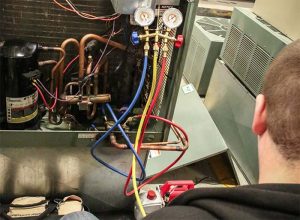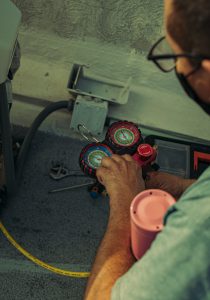The debate between heat pumps and gas furnaces is one of the most heated in the HVAC. But which is truly superior?
Here’s what you need to know.
What are the Differences Between Furnaces and Heat Pumps?
How a Furnace Works
Furnaces generate heat by burning oil or gas. The fuel is burned inside the furnace and then spread throughout the building through a blower fan. If the building reaches the temperature set by a thermostat, the gas valve is shut off to prevent further heating.

How a Heat Pump Works
Even though the name implies otherwise, a heat pump can both heat and cool buildings. These outdoor energy sources suck in the air. This air is either heated or cooled before being pumped into the house. It also recycles undesirable cool or hot air from inside the house back outside.
Heat Pump vs. Gas Furnace: What You Need to Consider
The debate between gas furnaces and heat pumps doesn’t have a clear winner. For example, here in Illinois, heat pumps cannot be the sole heating equipment and must take that into consideration. The right solution changes in different circumstances. When choosing a heating system, keep these issues in mind.
Efficiency
The rule of thumb is that heat pumps are more energy efficient than gas furnaces. However, this belief sweeps aside the subtleties of HVAC.

For one, furnace manufacturers have listened to demands for greener products. New launches use less energy. In addition, heat pumps are less energy-efficient in certain environments. Talk to a local HVAC technician to help you determine which type is more energy efficient in your area.
Durability
Your home will stand the test of time. Your heating system should too.
Luckily, both systems are durable. However, the lifespan of gas furnaces is a little longer. Furnaces typically last 20 years, while heat pumps on average last 15 years.
Air Quality
You deserve to take a deep breath after a long day at work.
Don’t make a bad day worse by choking on spore-filled air. That’s why both systems can be adjusted depending on climate and home specifications.
Breathe in. You’ve done the work to ensure that you’ve got clean air.
Cost
We all want to cut costs. And when it comes to energy sources, cutting costs doesn’t mean cutting quality.
If you’re looking to cut back costs, air pumps are the way to go. Air pumps are usually cheaper to install than furnaces. In addition, the dual action of air pumps also saves the cost of installing separate heating and cooling units.
Location
So, what’s the answer to the debate between the heat pump vs. gas furnace debate?
Location. Location. Location.
If you live in hot or warmer climates, go with a heat pump. Homes in colder climates fare better with furnaces since they don’t rely on outdoor air to warm them up.
Earn an HVAC License and Become a Heating Expert
Heat pumps and gas furnaces have many differences, but they have one similarity. They require the expertise of an HVAC technician to install them.
Be the judge your clients need with an HVAC license from ETI. Our hands-on training will have you install heating systems like a pro in no time.
Visit our www.eticampus.edu for more information on how to become an HVAC technician.
Learn more about HVAC training:
Schedule a campus visit
500 Joliet Rd Suite #100
Willowbrook, IL 60527
Get a first-hand look at your life as an ETI student with a tour of our campus.